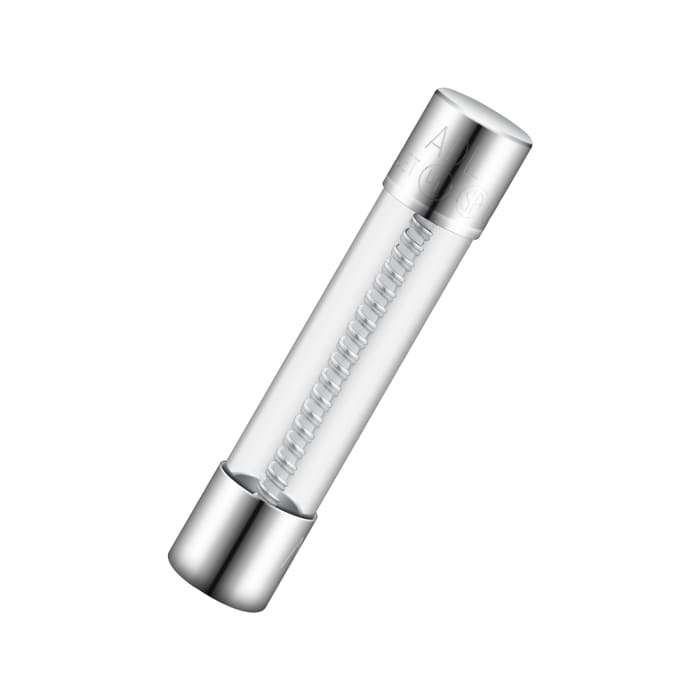Littelfuse 1A T Glass Cartridge Fuse, 6.3 x 32mm

Technical Document
Specifications
Brand
LittelfuseCurrent Rating
1A
Fuse Size
6.3 x 32mm
Fuse Speed
T
Voltage Rating
250V ac
Body Material
Glass
UL Class
UL 248-14
Series
313
Product details
Glass Body - (T) LBC
Glass tube fuses are available in with fast acting and time delay characteristics which makes them suitable for a variety of different applications.
Glass cartridge fuses are ideal for providing protection to devices or internal circuits from short circuits and overcurrent. They are deliberately weaker components which, when too much current is drawn, will blow. Once the fuse has blown it will need replacing in order to make the circuit complete and allow the flow of current.
Features:
Glass cartridge
6.3mm x 21 mm cartridge size
T Speed Rating
Low Breaking Capacity
Typical applications:
Cartridge fuses are a relatively cheap way of protecting electrical equipment from short circuits and overcurrent and can be used to protect electrical appliances such as motors air-conditions, refrigerator, pumps etc. They can be found in the following areas:
Industrial
Commercial
Home/Residential
Automotive
Additional Information:
What size is it?
6.3 x 32mm is a miniature cartridge size. Miniature fuses are ideal for the protection of electrical appliances, electronic equipment and component parts.
Why choose a glass fuse?
Glass and ceramic fuses have similar properties. However you may choose a glass fuse as it enables you to see the inside of the fuse. Therefore it is easier to determine whether the fuse has blown.
What are fuses used for?
• For the protection of components and equipment from costly damage caused by over-current.
• To isolate sub-systems from the main system once a fault has appeared
What is an over-current?
It is a setting where a circuit experiences a current that is higher than the normal operating current.
What Speed is it?
This particular fuse is “T” speed rated which means it is a slow acting fuse, sometimes referred to as anti-surge. It is able to tolerate higher levels for a short period, without shorting. Therefore, if a sudden change occurs, this fuse will not blow immediately. They are suitable for applications where a sudden flow of high current is required.
What is Breaking Capacity?
Breaking capacity is the level of current that the fuse can safely handle without exploding or rupturing. The breaking capacity of your fuse should be greater than the fault current of your electronic circuit. This particular fuse is LBC (Low Breaking Capacity).
Stock information temporarily unavailable.
Please check again later.
EGP 70.52
Each (In a Pack of 10) (ex VAT)
10
EGP 70.52
Each (In a Pack of 10) (ex VAT)
10
Technical Document
Specifications
Brand
LittelfuseCurrent Rating
1A
Fuse Size
6.3 x 32mm
Fuse Speed
T
Voltage Rating
250V ac
Body Material
Glass
UL Class
UL 248-14
Series
313
Product details
Glass Body - (T) LBC
Glass tube fuses are available in with fast acting and time delay characteristics which makes them suitable for a variety of different applications.
Glass cartridge fuses are ideal for providing protection to devices or internal circuits from short circuits and overcurrent. They are deliberately weaker components which, when too much current is drawn, will blow. Once the fuse has blown it will need replacing in order to make the circuit complete and allow the flow of current.
Features:
Glass cartridge
6.3mm x 21 mm cartridge size
T Speed Rating
Low Breaking Capacity
Typical applications:
Cartridge fuses are a relatively cheap way of protecting electrical equipment from short circuits and overcurrent and can be used to protect electrical appliances such as motors air-conditions, refrigerator, pumps etc. They can be found in the following areas:
Industrial
Commercial
Home/Residential
Automotive
Additional Information:
What size is it?
6.3 x 32mm is a miniature cartridge size. Miniature fuses are ideal for the protection of electrical appliances, electronic equipment and component parts.
Why choose a glass fuse?
Glass and ceramic fuses have similar properties. However you may choose a glass fuse as it enables you to see the inside of the fuse. Therefore it is easier to determine whether the fuse has blown.
What are fuses used for?
• For the protection of components and equipment from costly damage caused by over-current.
• To isolate sub-systems from the main system once a fault has appeared
What is an over-current?
It is a setting where a circuit experiences a current that is higher than the normal operating current.
What Speed is it?
This particular fuse is “T” speed rated which means it is a slow acting fuse, sometimes referred to as anti-surge. It is able to tolerate higher levels for a short period, without shorting. Therefore, if a sudden change occurs, this fuse will not blow immediately. They are suitable for applications where a sudden flow of high current is required.
What is Breaking Capacity?
Breaking capacity is the level of current that the fuse can safely handle without exploding or rupturing. The breaking capacity of your fuse should be greater than the fault current of your electronic circuit. This particular fuse is LBC (Low Breaking Capacity).
